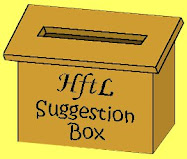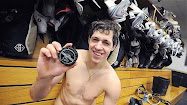
I know everyone asks it, "what was that penalty for, again?" Well did you ever think about who exactly those guys are who decide in the first place and what they do? Well, now you and I both are going to have a better understanding.
Each NHL game is officiated by a team of "linesmen" and "referees." This team consists of 2 linesmen and 2 referees.
The Referee's job is overall supervision of the game. He has control of all other officials, including off ice officials (i.e., video/replay judges). He is responsible for determining and announcing all penalties, and identifying and announcing the player scoring the goal or committing the infraction/penalty. He has no responsibility for assigning assists. His decisions are final. Referees may not stop the game in matters of off-side or icing as these are the duty's of the Linesmen. The one exception to this is injury/incapacitation of a Linesman.
The Linesman's job is primarily calling violations for "icing" and "offsides;" he is also responsible for "backing up" the Referee (by reporting his opinions on any incident that may have occurred on the ice). He is also responsible for facing-off the puck in all situations except the start of a game, and the start of each period or after the scoring of a goal (basically, anytime there is a face-off at center ice.
In addition to the players on each team working in harmony with one another, it is important as an official to work in harmony with your "officiating team." This means that you strive for consistency and communication (with your counterparts and also, to some degree, with those you are "overseeing").
Communication with your counterparts is very important because nothing is more frustrating to the players than not knowing exactly what actions are acceptable, and what aren't. Which is why all good officials try to avoid the "well, it's roughing in my zone" type of trap. Good officials will try to keep track of each other, in addition to watching what is happening in the game itself. Good officials want, above all, a safe and fair game.
Each NHL game is officiated by a team of "linesmen" and "referees." This team consists of 2 linesmen and 2 referees.
The Referee's job is overall supervision of the game. He has control of all other officials, including off ice officials (i.e., video/replay judges). He is responsible for determining and announcing all penalties, and identifying and announcing the player scoring the goal or committing the infraction/penalty. He has no responsibility for assigning assists. His decisions are final. Referees may not stop the game in matters of off-side or icing as these are the duty's of the Linesmen. The one exception to this is injury/incapacitation of a Linesman.
The Linesman's job is primarily calling violations for "icing" and "offsides;" he is also responsible for "backing up" the Referee (by reporting his opinions on any incident that may have occurred on the ice). He is also responsible for facing-off the puck in all situations except the start of a game, and the start of each period or after the scoring of a goal (basically, anytime there is a face-off at center ice.
In addition to the players on each team working in harmony with one another, it is important as an official to work in harmony with your "officiating team." This means that you strive for consistency and communication (with your counterparts and also, to some degree, with those you are "overseeing").
Communication with your counterparts is very important because nothing is more frustrating to the players than not knowing exactly what actions are acceptable, and what aren't. Which is why all good officials try to avoid the "well, it's roughing in my zone" type of trap. Good officials will try to keep track of each other, in addition to watching what is happening in the game itself. Good officials want, above all, a safe and fair game.
[this post was written by Kena]


.jpg)






No comments:
Post a Comment